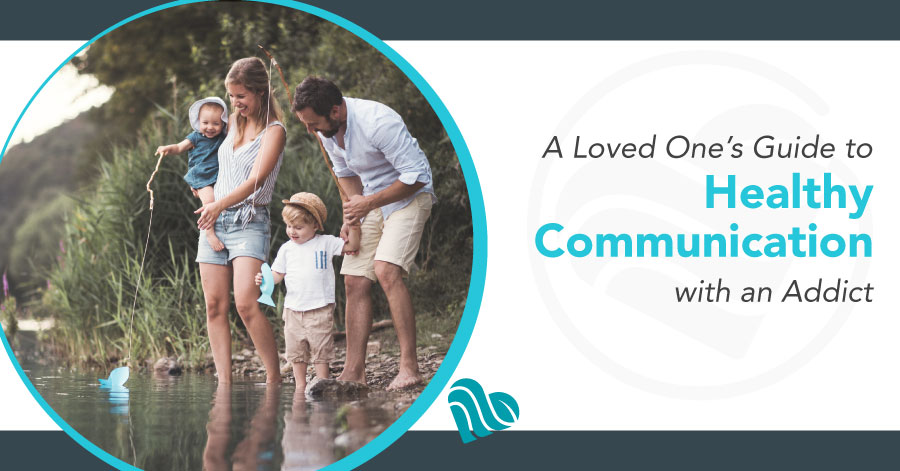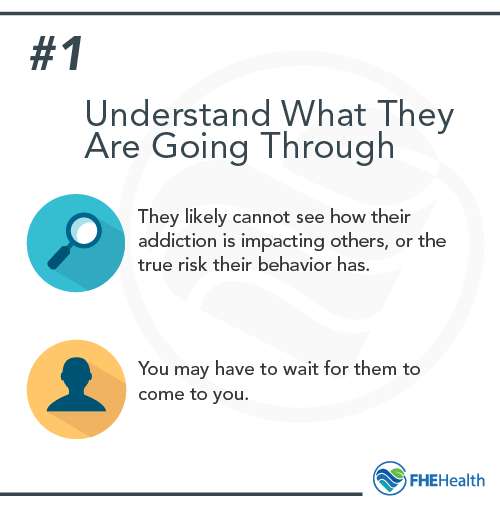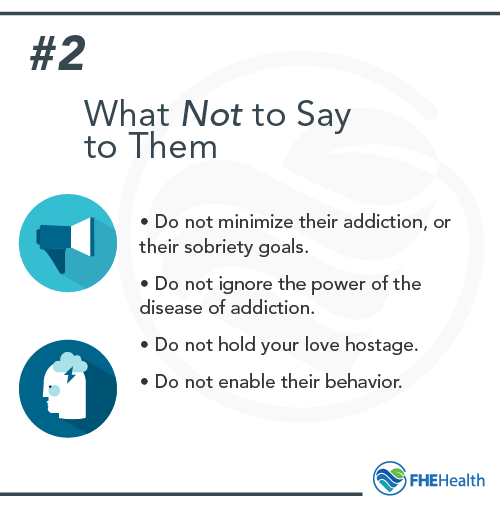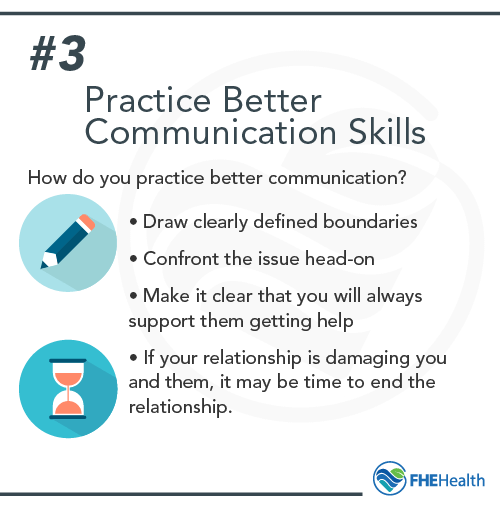
It’s not easy to watch a loved one continue to use drugs or alcohol when it’s very obvious to you that it’s destroying their life. You know they can turn things around if they just stopped using.
You may be tired of picking up the pieces and managing life on your own. Having healthy communication skills in a situation like this is critical to getting your message across in the right manner.
What Someone in Active Addiction Is Going Through
 You’ve tried to reach out, but they just won’t listen to you. Improving communication begins by understanding exactly what your loved one is facing in this moment.
You’ve tried to reach out, but they just won’t listen to you. Improving communication begins by understanding exactly what your loved one is facing in this moment.
During active addiction, an addict doesn’t see how their alcohol or drug use is impacting you. They’re driven by a constant need to find more of their chosen substance. A person who has an active addiction may be combative, unwilling to listen and in denial of what’s very obvious to you. No matter what you say to them, they’re not likely to change this opinion.
This attitude is generally due to the chemical changes occurring in their brain from the addiction. Their mind and body are telling them to continue to drink or use. Not doing so is physically painful and emotionally impossible.
In some situations, you have to wait for them to come to you. That’s why it’s so important to be ready when they do. Instead of approaching them with anger and frustration, be clear to your loved one that you’re here for them when they want to get help.
Show Compassion Without Condoning Their Actions
Healthy communication with a person in active addiction walks a fine line. You must be able to show them compassion through your anger and frustration. At the same time, they need to know you don’t condone their actions.
This starts with being clear to them that you’re concerned. Even if they haven’t told you they’re drinking or using drugs, convey to them how worried you are about their health. Making such a statement might anger them, but if it comes from a place of love and concern, your loved one should hear it.
Things You Should Never Say to an Addict
You should never say certain things when speaking to an addict about their use. You want to be sure your loved one understands your intention, but these statements are not likely to help you.
“You’re fine. Let’s get drinks tonight and just forget about the problem.”
This type of statement encourages drinking and makes it clear you don’t have a true understanding of their dire situation. Addiction related substance abuse can not be handled in moderation, it’s defining characteristic is that the user loses control of regulation.
“Why can’t you just stop?”
There’s no way a person in active addiction can just stop. This also doesn’t empower them to find help or to change.
“You would stop drinking or using drugs if you really loved me.”
This creates a significant amount of guilt for a person who has no way to stop without help.
“What do you drink for anyway? Your life isn’t that hard.”
Communicating about addiction in this manner makes their concerns seem invalid and indicates that you think they are weak.
“I will never respect or feel sorry for you until you take responsibility for your actions.”
This may really be the way you feel. However, it doesn’t provide an addict with any motivation to stop, and it doesn’t show them you will help.
“You can stop at any time. You just don’t want to.”
You need to recognize that addiction is a disease that limits a person’s ability to stop using a substance. They may very well want to stop, but they can’t do it on their own.
Skills for Better Communication in Recovery
 When your family member is facing this life-altering experience, they need help, motivation and the right tools. A component of that is having the resources available to them.
When your family member is facing this life-altering experience, they need help, motivation and the right tools. A component of that is having the resources available to them.
The second part is providing clear information and the correct wording to express your feelings. Here are some better things to say to your loved one when communicating about addiction.
“What you’re doing is hurting yourself and me. I can no longer support this. I will not give you money for drugs or alcohol.”
Here, you’re clearly telling them you’re done with the poor decision-making. You also communicate that you care. They know they can’t turn to you for help when they need financial support either.
“I’ve pretended not to notice the problem before. From now on, I will not spend time with you when you are drinking or using drugs. I will not allow you to be around me when you are intoxicated.”
This acknowledges your loved one’s actions and gives them specific information about what you will no longer do. At the same time, it doesn’t push them away or make them feel worthless.
“I won’t listen to you complain, but I will help you to get substance abuse treatment.”
Many times, those in active addiction have many excuses and problems. It can be hard to hear them make these claims because you know they can turn things around.
A better option than getting angry is to simply tell them you can no longer participate in feeling sorry for them. However, you’re offering them help to get treatment.
“I can’t remain in a relationship with you right now. Though I care about you, you’re hurting me with abusive language. I will help you to get substance abuse counseling but can’t be a part of your life until you do.”
In situations where you’re at risk, leave. Don’t stay and hold their hand.
Rather, provide a resource for them to get help and then step away from the picture. When they’re sober and getting treatment, they’ll see that you did what you had to do to protect yourself.
FHE Health Offers the Supportive Treatment Your Loved One Needs
Even if they can’t see it yet, there’s help available to your loved one. The right communication skills are just one step. Call FHE Health today and speak to one of our licensed and compassionate counselors at (833) 596-3502, 24 hours a day, for immediate assistance.






